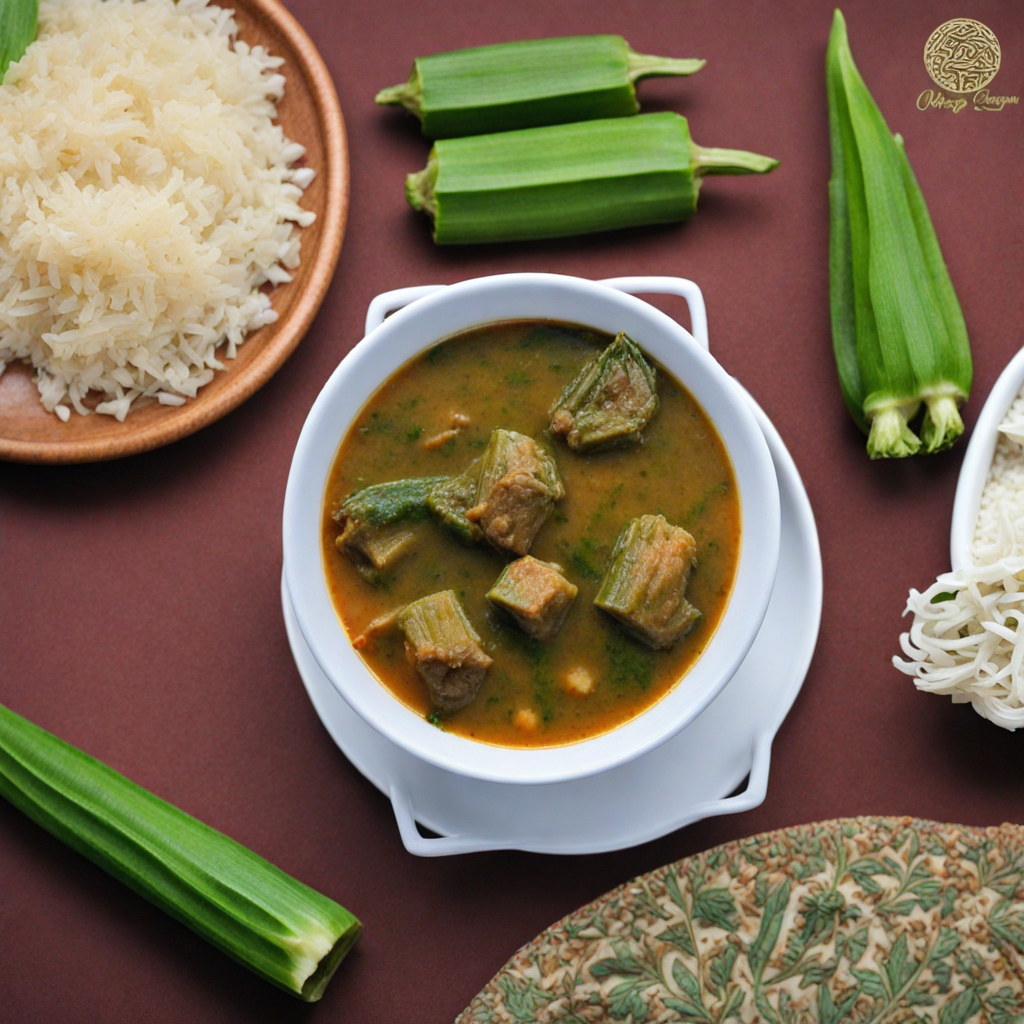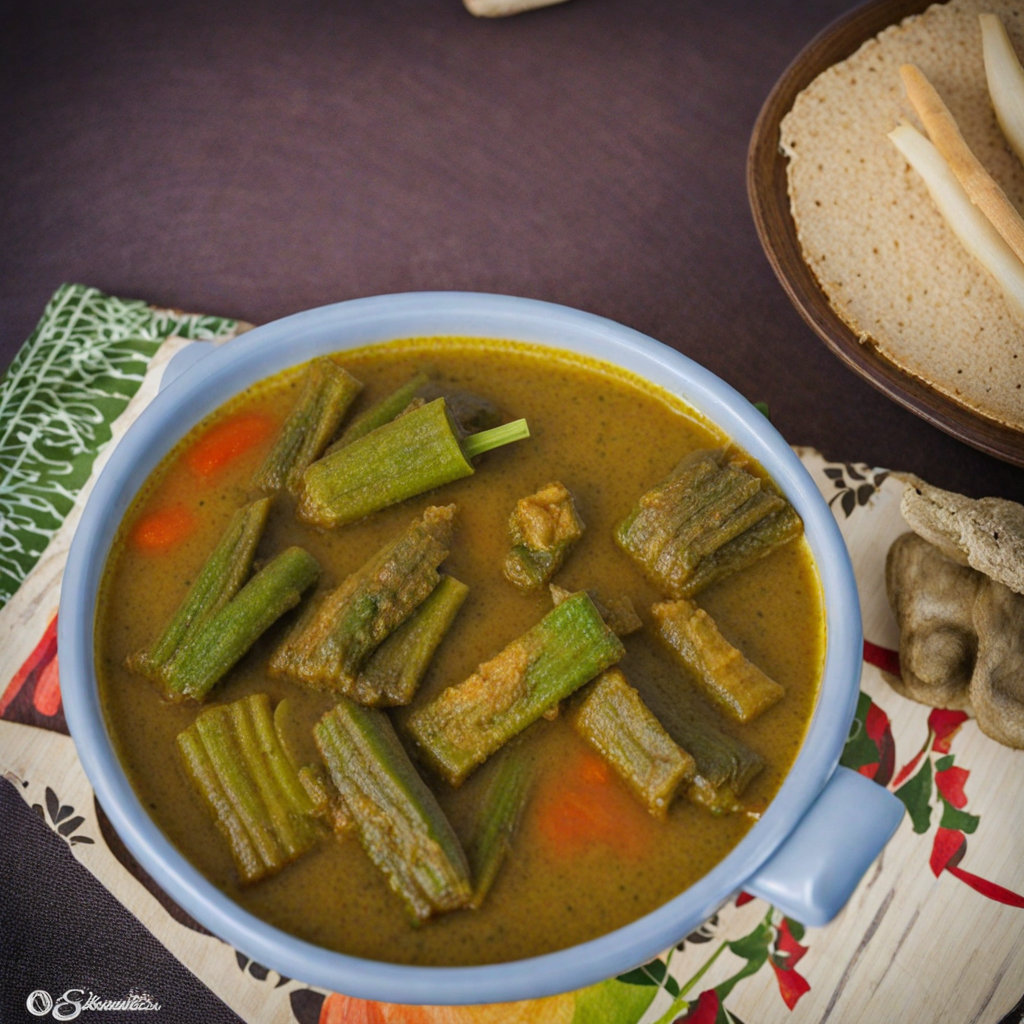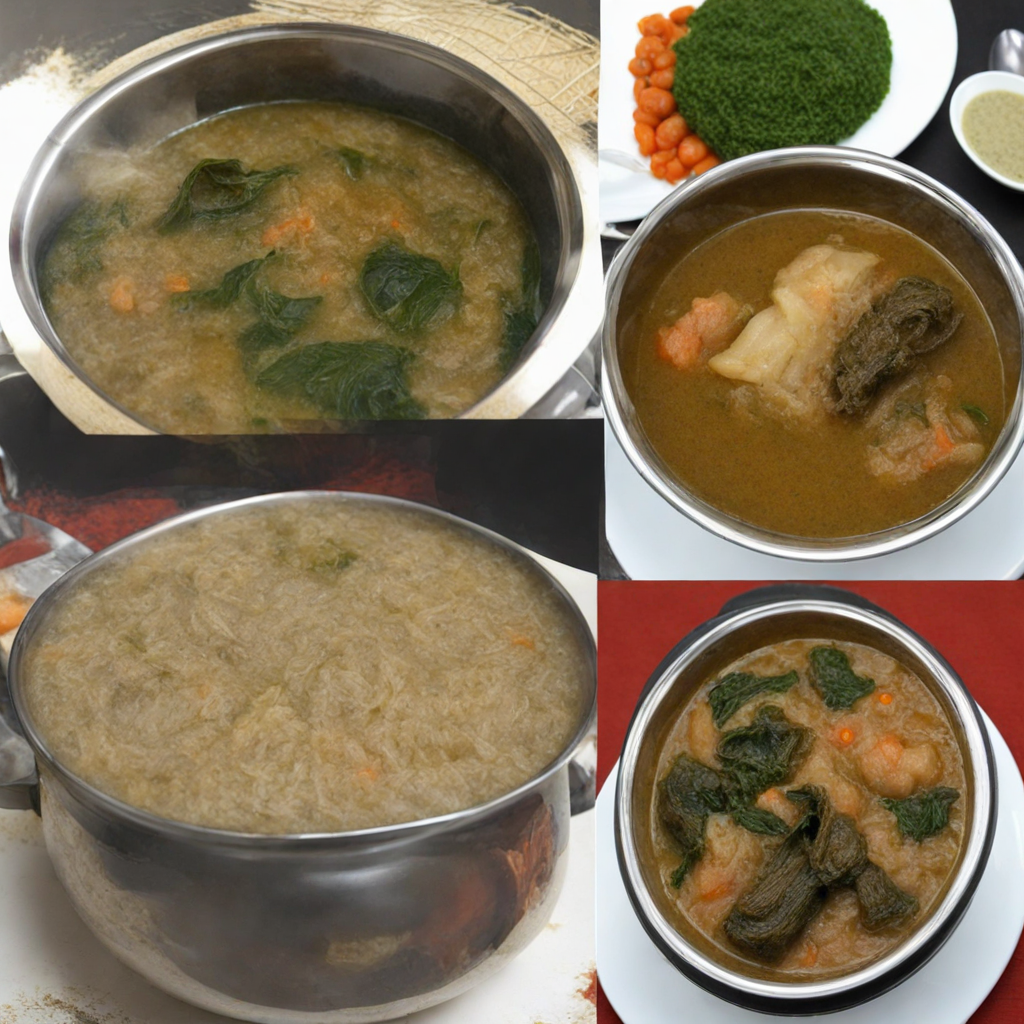Okra Soup
Okra Soup, a beloved dish from Nigeria, is a vibrant and hearty stew that showcases the unique flavor and texture of okra, a green vegetable also known as lady’s finger. This dish is characterized by its thick, viscous consistency, which is achieved by cooking the okra until it releases its mucilage. The soup is often made with a variety of meats, such as beef, goat, or chicken, and may also include fish for added depth. The combination of tender meat, fresh okra, and aromatic spices creates a delightful medley that tantalizes the taste buds and offers a comforting experience with every spoonful. In traditional Nigerian cuisine, Okra Soup is usually prepared with a blend of spices that may include ground crayfish, pepper, and palm oil, giving it a rich and robust flavor profile. The addition of seasonings like locust beans (iru) enhances the umami notes, making the soup both savory and satisfying. Some variations might incorporate vegetables like spinach or bitter leaf, adding a fresh element while maintaining the dish's signature earthiness. The contrasting textures of the tender okra and the succulent meat create a fulfilling and enjoyable meal. Typically served with a side of fufu, pounded yam, or rice, Okra Soup is a dish that not only nourishes but also fosters a sense of community, as it is often enjoyed in a communal setting. Diners use their hands to scoop up the soup with their starch of choice, embracing the cultural practice of sharing food and flavors. Each bite is an invitation to explore the rich culinary heritage of Nigeria, making Okra Soup a must-try for anyone looking to discover new and exciting tastes.
How It Became This Dish
The History and Cultural Significance of Okra Soup in Nigeria #### Origins of Okra Okra, known scientifically as *Abelmoschus esculentus*, is a flowering plant in the mallow family that has its roots in Africa. While the exact origins of okra are somewhat debated, it is widely believed that the plant was first cultivated in Ethiopia and then spread throughout Africa and into the Mediterranean region. The West African climate, with its warm temperatures and rich soil, provided an ideal environment for okra cultivation. By the time various West African tribes began to develop their distinct culinary identities, okra was already a staple in many diets. The vegetable itself is known for its long, green pods, which are rich in nutrients and have a unique mucilaginous texture when cooked. This slimy characteristic is particularly valued in soups and stews, as it acts as a natural thickener. Okra's versatility, flavor, and health benefits made it an integral part of many African cuisines, particularly in Nigeria. #### Cultural Significance of Okra Soup in Nigeria In Nigeria, okra soup (locally known as "Ila Asepo" or simply "Ila") holds a significant place in the culinary tradition. It is not just a dish; it encapsulates the rich tapestry of Nigerian culture, social practices, and communal life. Okra soup is often enjoyed during communal gatherings, family celebrations, and festive occasions. It is traditionally served with various types of swallow, such as pounded yam, fufu, or eba, which are used to scoop up the soup. The preparation of okra soup is an event that brings families together. The process often involves teamwork—washing, slicing, and cooking the okra, followed by the addition of ingredients like meat, fish, stockfish, and spices. Each family may have its unique recipe, handed down through generations, which highlights the significance of oral traditions in preserving culinary heritage. In this way, okra soup becomes a symbol of unity and togetherness, a dish that binds the family and community. #### Ingredients and Variations The traditional recipe for okra soup varies across Nigeria's diverse ethnic groups, each adding its unique twist. Common ingredients include fresh okra, palm oil, meat (such as goat, beef, or chicken), dried fish, stockfish, and various seasonings like ground crayfish, locust beans (iru), and pepper. The addition of these ingredients not only enhances the flavor but also reflects the agricultural bounty of the region. In the Yoruba culture, for instance, okra soup might be enriched with ground melon seeds (egusi) to provide a hearty texture and additional protein. In contrast, the Ibo people may prefer their okra soup with a thicker consistency, often incorporating more vegetables and spices to create a vibrant and flavorful dish. The Hausa people, known for their love of spices, might add a myriad of seasonings to create a distinctive flavor profile, showcasing the diversity of the dish across Nigeria. #### Historical Development The history of okra soup is closely tied to Nigeria's agricultural practices and trade. As the cultivation of okra became more widespread, the soup evolved alongside various cultural influences. The transatlantic slave trade played a crucial role in this evolution by introducing African culinary traditions to the Americas, where okra became a key ingredient in dishes like gumbo in Southern U.S. cuisine. Post-colonial Nigeria saw a resurgence in the appreciation for indigenous foods, including okra soup. The Nigerian independence movement revived interest in local cuisines as a way to assert cultural identity and pride. During this period, communities began to value traditional dishes as symbols of national heritage, leading to increased popularity and experimentation with okra soup. In contemporary Nigeria, okra soup has transcended its traditional roots and evolved into a dish that can be found in various settings—from street food stalls to fine dining restaurants. The globalization of food culture has led to a fusion of traditional and modern cooking techniques, resulting in innovative interpretations of okra soup. Chefs and home cooks alike are now exploring new ingredients and presentation styles, ensuring that this traditional dish remains relevant and appealing to younger generations. #### Health Benefits and Modern Interpretations Okra is not only celebrated for its flavor but also for its numerous health benefits. Rich in vitamins A, C, and K, as well as folate and dietary fiber, okra is touted for its potential to manage blood sugar levels, support digestive health, and promote heart health. As health-conscious eating becomes more prevalent, okra soup is gaining recognition as a nutritious option that aligns with modern dietary preferences. In recent years, there has been a shift towards using organic and locally-sourced ingredients in the preparation of okra soup. Many Nigerian chefs are now emphasizing sustainability and health by incorporating fresh, seasonal produce and reducing reliance on processed ingredients. Additionally, the rise of plant-based diets has led to creative adaptations of okra soup, with vegetarian and vegan versions gaining popularity, showcasing the dish's versatility. #### Conclusion Okra soup is more than just a dish; it is a narrative woven into the cultural fabric of Nigeria. Its origins, tied to the ancient agricultural practices of Africa, reflect a deep connection to the land and the people who cultivate it. The dish's evolution over time—from traditional communal meals to contemporary culinary adaptations—illustrates its resilience and adaptability in a rapidly changing world. As Nigeria continues to embrace its culinary heritage while exploring new horizons, okra soup remains a vibrant symbol of cultural identity, unity, and the rich history of the Nigerian people. Whether enjoyed in a bustling market or a family gathering, okra soup serves as a delicious reminder of the country's rich agricultural past and its dynamic present, ensuring that this beloved dish will be cherished for generations to come.
You may like
Discover local flavors from Nigeria







